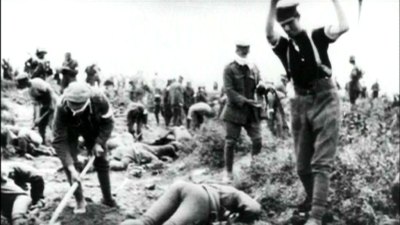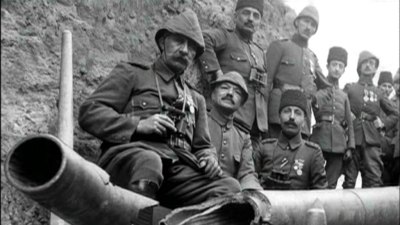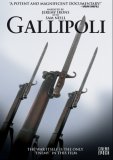| Reviews & Columns |
|
Reviews DVD TV on DVD Blu-ray 4K UHD International DVDs In Theaters Reviews by Studio Video Games Features Collector Series DVDs Easter Egg Database Interviews DVD Talk Radio Feature Articles Columns Anime Talk DVD Savant Horror DVDs The M.O.D. Squad Art House HD Talk Silent DVD
|
DVD Talk Forum |
|
|
| Resources |
|
DVD Price Search Customer Service #'s RCE Info Links |
|
Columns
|
|
|
Gallipoli (2005)
"Gallipoli was the stark reality of a group of amateur citizen soldiers facing war's reality for the first time. And there was nothing glorious about it. It was mistake, blunder, muddle, death and disease." Christopher Pugsley, Royal Military Academy, Sandhurst.

It's been some time since I've seen director Peter Weir's 1981 feature-film take on the infamous Dardanelles Campaign, but I do remember as a boy thinking Gallipoli with Mel Gibson was terribly romantic, what with the handsome leads and the gorgeous widescreen photography - even though I'm sure my adolescent reaction wasn't Weir's ultimate intention. Good-looking war films, brought off with panache and pictorial splendor, regardless of their philosophical intent, have an uphill battle against unintentionally romanticizing (and therefore ameliorating) their messages.
Not so with writer and director Tolga Ornek's 2005 documentary Gallipoli (renamed for Western release from the original Turkish title, Gelibolu). There's no doubt it's a handsome film, and beautifully produced. But the genuine horrors that met the soldiers of the Battle of Gallipoli are translated to the audience without a sheen or patina of nostalgia or sweet regret, leaving with the viewer only a feeling of inhuman, senseless slaughter for an operation that should never have been authorized in the first place. Only the individual acts of courage and kindness of soldiers from both sides of the campaign, and their perseverance in the face of months of unspeakable conditions, can be viewed in a positive light here.
Briefly, the April 1915 attack on the Gallipoli peninsula (after a disastrous all-naval assault in February failed) was an effort by the Allied forces to open up a supply route to Russia, which was cut off by the Turks at the Dardanelles straits, and to knock out the remaining forces of the Ottoman Empire. It was a daring plan, involving an intricate series of landings by Allied troops (made up primarily of ANZAC forces - Australian and New Zealand Army Corps - and the French) all along the peninsula. Unfortunately, a series of disastrous missteps right from the beginning doomed the operation, including non-existent intelligence about the strength and capability of the Turkish army, an arrogant dismissal of the capabilities of these homeground-defending troops, tragically insufficient plans for evacuating and tending for the wounded, woefully inadequate supplies (Gallipoli always lost out to the Western front assault), and a belligerent, almost suicidal disregard for human life, as wave after wave of soldiers on both sides "went over the top" to their certain doom. The campaign lasted an incredible eight months, with a final body count of over 120,000 troops. It was a military disaster of the first order.
Director Ornek's intent seems two-fold here. He wants to show the unimaginable terrors that both sides endured for this military folly, but he also wants to bring out the indomitable spirit that both sides displayed in the midst of the most adverse physical and psychological conditions - and the utter sadness that goes with knowing how pointless their deaths ultimately were in the end. Stylistically, Gallipoli doesn't run too far outside the standard framework of most contemporary documentaries, with Ornek using judicious re-enactments (many of which are shot in a wonderfully abstract, almost surreal fashion), along with the now-standard application of authentic photos and engravings (gussied up with camera movements and CGI 3D "Viewmaster" effects), commentary by experts and historians, and voice-over narration, particularly of newly discovered diaries and letters of the combatants from both sides (a sizeable feat, considering the literacy rate for the Turks was only about 5%).

Despite the familiarity of his filmic structure, Ornek knows how to stage this documentary for maximum visceral impact. There aren't any huge battle reenactments, nor scenes of actors pretending to receive telegrams or digging trenches or any other similar such "linking" inserts that so many TV documentaries use today to pad out their features. Instead, Ornek wants you to feel the impact - both physically and emotionally - of what these soldiers saw, what they smelled, what they tasted, and what they heard. The opening is a fantastic slow-motion shot of a bomb exploding in a trench, leaving the viewer not wondering in appreciation of the special effect used, but incredulous as to how any soldiers survived such onslaughts on a daily basis. When Ornek wants to convey the butchery of wave after wave of British soldiers who were sent to their certain death when they "went over the top," he merely focuses tightly on a chipped, battered machine gun that spits fire over and over again in tightly-edited montages. And when he wants you to understand the absolute filth and disease that met these soldiers in every aspect of their lives - no toilet paper, flies buzzing from the opened mouths of rotting corpses to the dung heaps of primitive slit latrines to the melting berry jam pots of the soldiers - he focuses on a repulsive scene of hundreds of flies, swarming over plates and pans and drinking water and jam pots, drowning in the sweet food. These shots speak volumes under the steady narration by Jeremy Irons and Sam Neill as they dispassionately recount the vile conditions under which these soldiers toiled. Nothing in this Gallipoli looks like Weir's very pretty, well-scrubbed Gallipoli.
Importantly, though, director Ornek does allow that within this maelstrom of evil, of senseless death and carnage, the very best qualities of human nature did indeed emerge - on both sides of the campaign. Instances of pity on both sides for the slaughter that routinely took place are recounted (the diary entries here are marvelous, hearing the doomed, tragic words of the soldiers caught up in this impossible situation), as are the feelings of most of the troops that what they were doing was worthwhile, for king and country and god, despite all the evidence to the contrary. But Ornek isn't overly sentimental about these genuine, true emotions; he puts them in their proper context. He may recount how the two sides met in friendship during a cease-fire, but he's careful to also show the random, illogical forms of violence that inevitably appeared, despite feelings of goodwill from soldiers who began to see their enemies as human beings, not targets (the story of a Turk who, unmolested by British snipers, gathered wood everyday out in "No Man's Land," is ultimately harrowing when a raw recruit, unaware of this accepted gesture of permissiveness, picks him off one morning).
Indeed, the final feeling that Gallipoli creates is one of utter waste. Honest enough to show repulsive pictures of corpses mangled and torn by the vicious artillery attacks, Ornek may indeed let you know that the soldiers were able to take something of value away from their nightmarish experience, but ultimately, his charge is one of a total squandering of lives in service of a campaign that achieved no significant military value. It's a sobering message, powerfully driven home.

The DVD:
The Video:
The anamorphically enhanced, 1.78:1 widescreen transfer for Gallipoli looks sharp and clear, but I did notice some very minor interlacing effects here and there. Overall, though, quite a nice picture with a suitably muted color palate.
The Audio:
The English 2.0 stereo audio mix is nicely balanced during the noisier battle sequences, and all dialogue is crisp and cleanly delineated. There are no subtitles or close-caption options.
The Extras:
The only extras included for Gallipoli are an original trailer for the film and a small still gallery.
Final Thoughts:
Unflinching in its depiction of the absolute horrors that soldiers suffered during the infamous Battle of Gallipoli, director Tolga Ornek's 2005 documentary has an hallucinatory rhythm that's quite sensuous - but never in the service of romanticizing this nightmarish story of one of the greatest military slaughters in modern history. I highly recommend Gallipoli.
Paul Mavis is an internationally published film and television historian, a member of the Online Film Critics Society, and the author of The Espionage Filmography.


|
| Popular Reviews |
| Sponsored Links |
|
|
| Sponsored Links |
|
|
| Release List | Reviews | Shop | Newsletter | Forum | DVD Giveaways | Blu-Ray | Advertise |
|
Copyright 2024 DVDTalk.com All Rights Reserved. Legal Info, Privacy Policy, Terms of Use,
Manage Preferences,
Your Privacy Choices | |||||||














